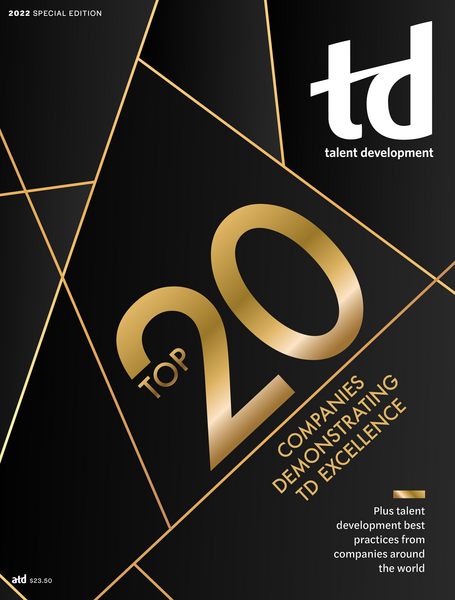TD Magazine Article
2022 Additional ATD Award Winners
The Association for Talent Development recognizes individuals who have made significant contributions to the talent development field.
Wed Jun 15 2022

Soft Skills and EI Are Vital Now and for the Future
The future of work is here, and the importance of talent development may never have been greater. It's a world of technology and people working alongside robots yet with a strong, human-centered approach. With that in mind, what strategic steps can and should talent developers take in their workplaces to make it a place where individuals want to work?
Jack and Patti Phillips, who need no introduction to individuals in the TD industry, are this year's recipients of the Talent Development Thought Leader Award. They advise TD practitioners to focus on efficiency and productivity, accomplishing more with less. That isn't about working harder—which is not an option—but rather about working smarter, which is something that TD professionals must do as well.
Further, the Phillips recommend that TD professionals embrace creativity and innovation and accelerate the use of automation and artificial intelligence. Lead by example and loosen the resistance that employees and leaders often have when it comes to automation.
Soft skills also are critical for how people now work. "It is up to us in talent development to convince executives that investing in the development of these skills pays off," the Phillips note. "While many executives realize that the most-admired organizations, most-innovative organizations, most-productive organizations, most-sustainable organizations, and the great places to work are all created with soft skills, we still need evidence that soft skills programs add value." Prove that through using a credible measurement and evaluation process, they add.
Daniel Goleman—internationally known psychologist, author of Emotional Intelligence, and recipient of the 2022 Talent Development Champion Award—has long understood the importance of such skills. "Companies today are increasingly looking through the lens of emotional intelligence when hiring, promoting and developing their employees. Years of studies show that the more emotional intelligence someone has, the better their performance," explains Goleman in his CNBC Make It article, "Harvard Researcher Says the Most Emotionally Intelligent People Have These 12 Traits. Which Do You Have?"
Those skills aren't inherent; individuals must work at and develop them. Goleman notes that people can hone their emotional self-awareness first by acknowledging their weaknesses and understanding their strengths. Another aspect of emotional intelligence, self-management, includes the core competencies of emotional self-control, adaptability, achievement orientation, and a positive outlook.
"Accept that there will always be sudden changes and challenges in life," he writes. "Try to understand the context of the given situation and adjust your strategy or priorities based on what is most important at the time."
Given the many work challenges but also opportunities that now exist, what could the next three or so years hold? "The opportunity ahead for all of us is in how we will ensure that we have great teamwork, engagement, and collaboration in an often isolated or remote world," the Phillips explain. "Of course, we will have to learn to balance our efforts to create collaborative environments with efforts to respect employee time as they attempt to actually do the work. Flexible work systems will be dominant in many places, which will call for more and better technology-enabled learning."
Aim for Fairness in TD Opportunities
Although selective (that is to say, exclusive) talent development programs can benefit participants, the effects such programs have on employees who aren't selected can be harmful to their morale, retention, and work effort. That's what Thomas Kramer found when conducting research for his doctoral dissertation, "The Effects of Perceived Organizational Justice of Inclusive Talent Management Practices on Employee Work Effort." Currently an assistant teaching professor of management at Penn State University, Mont Alto, Kramer earned his doctorate in human resource development from the Soules College of Business at the University of Texas at Tyler. His research earned him ATD's Dissertation Award.
What was the most significant finding from your research?
When employees perceived the process of talent management selection to be procedurally fair, they were more likely to feel that the talent management selection was just, resulting in higher work effort.
What are the disadvantages of exclusive talent management practices such as high-potential development programs?
Interestingly, it is not the mere existence of exclusive talent management practices that has negative effects on those not selected. Rather, the deployment and communication of these programs shape employee perceptions of justice and fairness. That is what colors the employee's job satisfaction and work effort.
Think of a courtroom trial. The parties are more accepting of the outcome (regardless of winning or losing) if they feel the process was fair and just.
Based on your research, what recommendations do you have for TD professionals in terms of offering inclusive development programs?
The debate continues between the inclusive and exclusive approach. However, the outcome in terms of work effort and other organizational citizenship behaviors is more nuanced and strongly related to how the talent development program is deployed. This research suggests that a more just and equitable approach to talent development will result in better outcomes that help to mitigate the potential drawbacks of an exclusive approach to talent development.
What surprised you most as you conducted the research?
One of the most interesting findings was the popularity of the topic of talent development in practitioner publications and the lack of robust empirical research in the academic arena. Organizations are spending billions of dollars on talent development without the rigorous, scientific research to support and inform the decisions they are making. There is a real opportunity for researchers to investigate the growing field of talent development and continue to make new discoveries in this important arena.
Lifelong Learning and Resiliency Are Key to Excelling
You're not in the talent development industry if you don't care about people, regardless of your career stage or the aspect of the profession within which you practice. "I love being able to invest in people, watch them grow, and then see them develop and train others," says Bob Clark, recipient of this year's Talent Development Outstanding Professional Award and senior manager of training and implementation with AutoNation. Katja Zurcher, winner of the One to Watch Award and a senior L&D facilitator at Abrigo, points out that "whichever talent development career path you choose, you ultimately get to play a role in helping other people learn and grow."
To excel in the profession, Clark and Zurcher have relied on earlier experience. Clark, hearkening to his days in the US Air Force Academy and for-profit businesses, says, "As a business leader in several different industries, I learned the importance of having well-trained associates. This understanding and skill set helps me in my talent development role. I communicate to operational leaders and my own team the importance of training and developing our associates in ways that change behaviors and improve business results."
Zurcher, too, brought skills and knowledge from prior endeavors to her TD career. While pursuing her master's degree in fiction writing at Columbia University, she realized the value of writers engaging their readers in a short period: "As a facilitator and an instructional designer, I \[also\] have a very small window in which to capture attention, establish relevance and urgency, and convince learners to jump willingly from the burning platform."
In the past two years when many of us moved to remote work, one of the immediate challenges for TD professionals was to move their in-person courses to a virtual modality. "I realized that I needed to lean into the strengths and nuances of the virtual world," Zurcher explains. "I had to embrace the fact that it would not be the same experience, nor did it need to be."
Clark also emphasizes the need to leverage the milieu appropriately, such as by "using different techniques to engage learners every three to four minutes in virtual training. I continuously challenge my team to find new ways to engage our learners."
Zurcher says that recently, "One of my biggest professional hurdles has been pouring my heart and energy into a project that I'm excited about, only to have it shelved because of a changing business need. A leader of mine helped me reframe these experiences over the course of many coaching conversations. Instead of viewing them as letdowns or wasted time, I see them now as creative learning exercises that help support the next project I'm assigned to."
The significance of lifelong learning is evident for both awardees. Clark is currently pursuing a Certified Professional in Talent Development credential. Meanwhile, Zurcher organized the ATD San Antonio Chapter's annual LEAPS conference, where seven presenters had the opportunity to facilitate in front of the ATD community for the first time during the conference breakout sessions.

